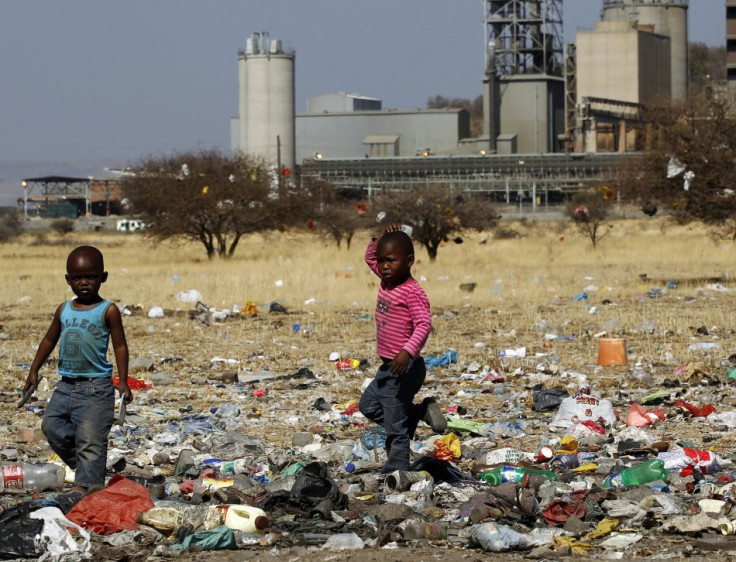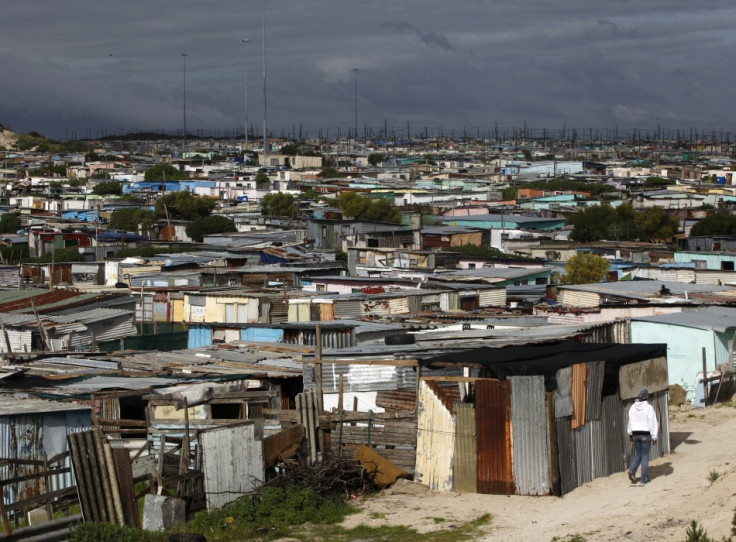My South African Adventure: 23 Years after Apartheid, Townships Still Mired in Poverty [BLOG]
Helping out in Catholic soup kitchens, while grinding poverty claims black and white.

There are a couple of things over recent days that have given me pause for thought.
The first relates to the immense amount of poverty and deprivation in South Africa and the fact that, all too soon and without even noticing it, people like me, even if they reckon that they have some kind of social conscience, can all too easily find themselves insulated from, and inured to, it.
When I first came to this country, I simply couldn't tear my gaze away from the vast expanses of corrugated iron that are the townships on the outskirts of Cape Town, and which seem to stretch on for ever as a testimony to human misery - and as a reproach to the rest of us for allowing this abomination to be.
While some progress has been made in building small breezeblock homes to replace these tumbledown shacks that lack even the most basic sanitation, it's difficult to imagine how anyone could live in such conditions. It really is a testament to human endurance as well as people's innate adaptability and ability to survive no matter what.
But as time goes on, to my immortal shame, I find myself staring less and less at these scarcely habitable monstrosities as I sit in my comfy rental car and I wonder if, after a while, I'll even notice. It's scary how quickly you get used to the impossible.
Closer to home, meanwhile, there's the matter of the relative value of R500 (£35). The other day, I met a lady who, under the auspices of the Catholic Church, organises a couple of soup kitchens for children (and all too often hungry adults too) in Cloetesville, one of the "coloured" or mixed race areas of Stellenbosch.
One of the key issues she faces is that, as tends to be the case everywhere, it's the same people from among the congregation who keep on providing the vital veg, meat, rice and lentils each week. The local Spar also gives bread that's just passed its sell-by date.
Stark contrasts
But when it's not available, she has to try to eke out a R500 monthly donation from someone who likewise has to cover the cost of gas and any other supplies that may not have materialised for whatever reason.
Which is all well and good, but the fact that my beloved and I spent more than twice that on a posh lunch at the IndoChine restaurant at his favourite wine farm, the Delaire Graff, to celebrate our 12th wedding anniversary this weekend, does make you think.
Don't get me wrong - it was a fabulous experience. They seated us in a lovely blue wood, semi-circular loveseat that would have afforded stunning views of the mountains if it hadn't been so misty and wet that day, although the quality of the food and expertly matched tipples more than made up for any deficits weather-wise - and the company was superlative too, of course.

But the contrast with the soup kitchen scenario was stark. While friends have told me that I can't right every wrong in the world, it did serve to point up to me the huge canyons between those who are lucky enough to have and those who have not. Because there's not even anything approaching the UK's increasingly despoiled social security system to fall back on here as a safety net. There's nothing.
And so, with unemployment rates upwards of 25% across South Africa, and a huge 50% or so in many of the townships, one of the few things that all too many people rely on to get by is charity and handouts, if they can get them.
So my role in the soup kitchen context, while meagre, will hopefully prove at least vaguely useful. The idea is that I take letters stamped with the official emblem of the Catholic Church to the various supermarkets in the vicinity in order to ask them for veg donations, hopefully on a regular basis.
White, middle-aged males
Once pick-up times/days have been agreed, it'll be my role to deliver any offerings to the hall at St Mark's Church and to help with sorting it into two bundles, before it's carted off to the good women of Cloetesville for cooking up.
And it does appear that Cloetesville is a community in need of help in more ways than one. According to the care professionals that I'm working with to put on a substance abuse educational drama at the end of September https://www.ibtimes.co.uk/south-african-adventure-keep-safe-drugs-blog-448913, it suffers from the worst addiction rates in the Stellenbosch area, closely followed by the Idas Valley, another coloured community in which we'll be holding a second event. So things certainly aren't easy there.
The second thing that gave me pause for thought this week though was the apparent plight of a growing number of white, middle-aged South African males. I'd met a couple of guys for lunch and we were talking about the useful role that the almost forgotten art of storytelling can play in corporate life by helping to stimulate discussion and get a point across in an entertaining and memorable, as opposed to dull PowerPoint-y, kind of fashion.
As this form of consultancy is only nascent here, I inquired about who their customers tended to be. They replied, with a remarkable lack of bitterness, that things weren't always easy because large corporates were effectively no-go areas for them as they didn't fit into the black economic empowerment (BEE) agenda. As a result, most of their work was generated, via word of mouth, from smaller, more flexible organisations that were more able to fly below the radar.
And similar tales of woe seem to be making the rounds elsewhere. Nearly everyone you speak to in the white community appears to have a story about a friend, or friend of a friend, who found their services no longer required after training up a BEE successor, a situation that resulted in them not only losing their job, but in some instances, their home.
So, while John Simpson's article on the BBC website entitled 'Do white people have a future in South Africa?' may have been leapt on in fury by the establishment over here, it would appear to have at least a grain of truth in it, no matter how politically unpopular.
And when push comes to shove, what is very clear is that poverty and hunger are no respecters of colour.
READ:
My South African Adventure: Missing the Charm of the English Pub [BLOG]
Cath Everett is a resting journalist who has written about business, technology and HR issues for over 20 years. She recently moved from the UK to South Africa with her husband
© Copyright IBTimes 2025. All rights reserved.




















